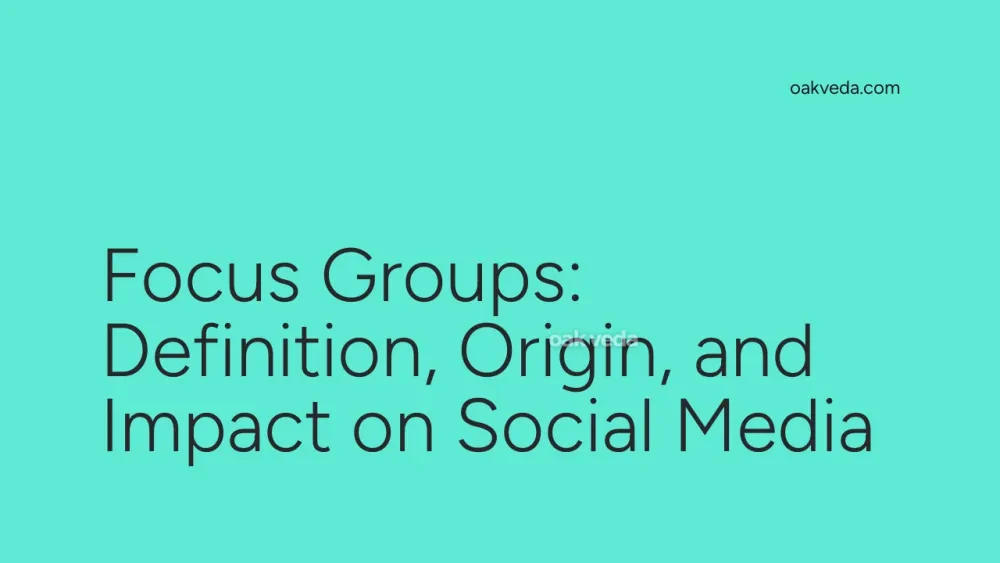
What are Focus Groups?
Focus groups are a qualitative research method used to gather in-depth insights from a small, diverse group of people about a specific topic, product, service, or concept. In the context of social media, focus groups have become an invaluable tool for marketers, brands, and researchers to understand user perceptions, behaviors, and preferences.
Origin and Development of Focus Groups
The concept of focus groups originated in the 1940s, pioneered by sociologist Robert K. Merton. Initially used in academic research, focus groups gained popularity in marketing during the 1950s and 1960s. As social media emerged in the early 2000s, focus groups adapted to this new digital landscape, becoming an essential component of social media marketing strategies.
How Focus Groups Work in Social Media Marketing
In the realm of social media, focus groups typically involve:
- Selecting a diverse group of 6-10 participants
- Conducting moderated discussions about social media platforms, content, or campaigns
- Gathering qualitative data on user experiences, opinions, and emotions
- Analyzing insights to inform social media strategies
These sessions can be conducted in-person or virtually, allowing for greater flexibility and broader participant reach.
Types of Focus Groups for Social Media Research
- Traditional face-to-face groups: Participants meet in person to discuss social media topics
- Online focus groups: Conducted via video conferencing or specialized platforms
- Mobile focus groups: Utilize smartphone apps for real-time feedback on social media experiences
- Hybrid groups: Combine in-person and virtual participation
Popular Examples of Focus Groups in Social Media
- Facebook's user experience research: The platform regularly conducts focus groups to improve its features and user interface.
- Twitter's beta testing program: Selected users participate in focus groups to provide feedback on new features before wide release.
- Instagram's content creator focus groups: These sessions help the platform understand the needs of influencers and content creators.
Impact of Focus Groups on Social Media Culture
Focus groups have significantly influenced social media culture by:
- Shaping platform features and algorithms based on user feedback
- Informing content strategies for brands and influencers
- Identifying emerging trends and user preferences
- Helping platforms address issues like misinformation and user safety
Controversies Surrounding Focus Groups in Social Media
While focus groups offer valuable insights, they're not without criticism:
- Representativeness: Small group sizes may not accurately reflect the broader user base
- Groupthink: Participants might conform to dominant opinions, skewing results
- Artificial environment: The focus group setting may not capture authentic user behavior
- Bias: Moderator influence or participant selection can impact outcomes
How Brands and Influencers Use Focus Groups
Social media marketers leverage focus groups to:
- Test content ideas: Gauge audience reactions to potential posts or campaigns
- Refine messaging: Ensure brand communication resonates with target audiences
- Explore platform preferences: Understand which social media platforms their audience favors
- Gather feedback on influencer partnerships: Assess the effectiveness of influencer collaborations
- Identify pain points: Discover user frustrations with current social media experiences
Future Trends in Focus Group Research for Social Media
As social media continues to evolve, focus groups are adapting:
- AI-powered analysis: Machine learning algorithms will help interpret focus group data more efficiently
- Virtual reality focus groups: Immersive environments for more engaging and realistic discussions
- Continuous feedback loops: Integration of focus group insights with real-time social media analytics
- Cross-platform studies: Exploring user behavior across multiple social media platforms simultaneously
FAQs about Focus Groups in Social Media Marketing
-
How many participants should a social media focus group have? Typically, 6-10 participants are ideal for meaningful discussions while ensuring diverse perspectives.
-
How long does a focus group session usually last? Sessions generally run between 60 to 90 minutes to maintain participant engagement and gather sufficient insights.
-
Can focus groups replace social media analytics? No, focus groups complement analytics by providing qualitative insights that numbers alone can't capture.
-
How often should brands conduct focus groups for their social media strategies? The frequency depends on the brand's needs, but quarterly or bi-annual sessions are common for staying updated on user preferences.
-
Are online focus groups as effective as in-person sessions? Online groups can be equally effective and offer advantages like broader geographic reach and increased participant comfort.
Focus groups remain a powerful tool in the social media marketer's arsenal, providing deep insights into user behavior and preferences. By combining focus group findings with quantitative data and analytics, brands can create more effective, user-centric social media strategies. As social platforms continue to evolve, the role of focus groups in shaping digital experiences will likely grow, adapting to new technologies and user expectations.
You may be interested in:
- Retargeting: Definition, Origin, and Impact on Social Media
- Innit: Definition, Origin, and Impact on Social Media
- AI in Social Media: Definition, Origin, and Impact
- Stan: Definition, Origin, and Impact on Social Media Culture
- OOMF: Definition, Origin, and Impact on Social Media
- Cringe: Definition, Origin, and Impact on Social Media

